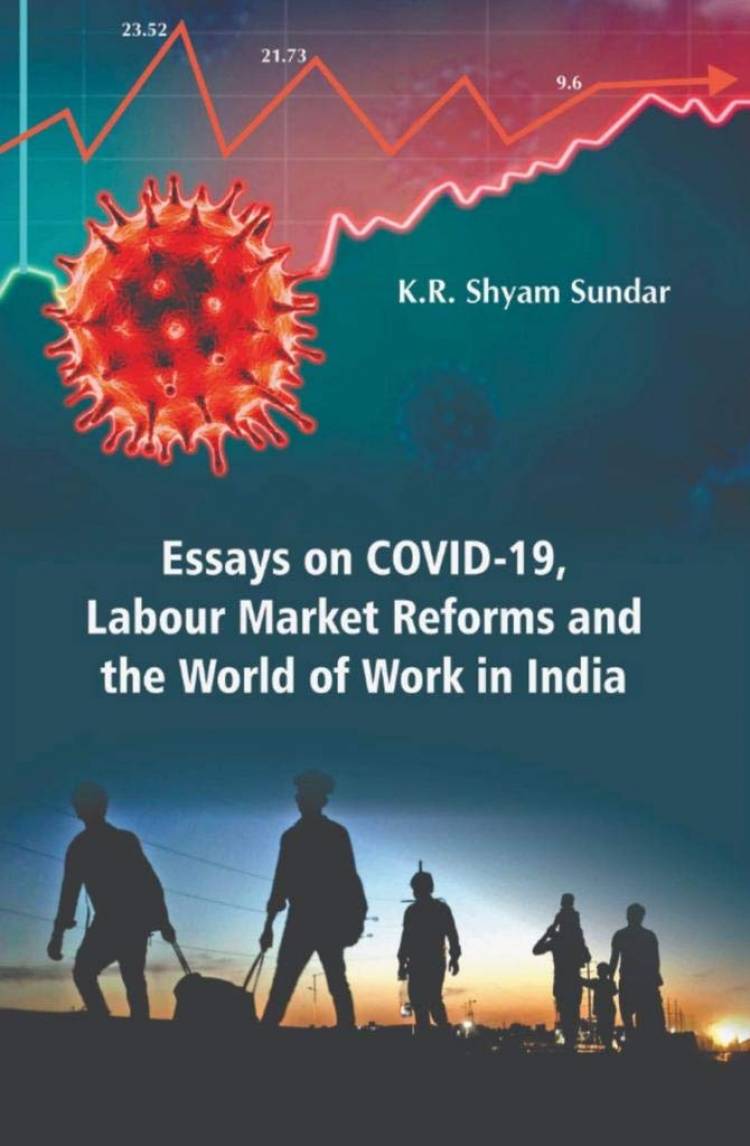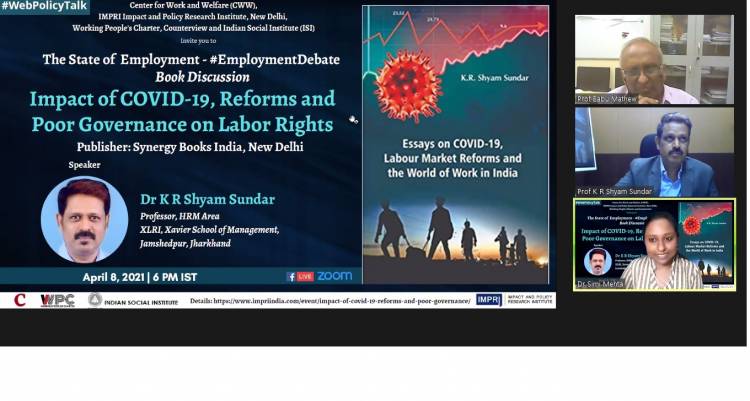‘IMPACT OF COVID-19, REFORMS, POOR GOVERNANCE ON LABOUR RIGHTS IN INDIA’ - Books released on the impact of COVID-19 on the Labour Market
‘IMPACT OF COVID-19, REFORMS, POOR GOVERNANCE ON LABOUR RIGHTS IN INDIA’ - Books released on the impact of COVID-19 on the Labour Market
Ø The book authored by Dr. K.R. Shyam Sundar, XLRI, provides critical analyses of the impact of the policies, laws, government regulations issued concerning workers, especially the migrant and informal workers, the poor labour market governance and labour law reforms on labour rights in a Pandemic-struck economy in India
8th April, 2021: Eminent Labour Economist & Professor, Human Resources Management Area at XLRI - Xavier School of Management, Dr. K.R. Shyam Sundar’s new book titled – ‘IMPACT OF COVID-19, REFORMS, POOR GOVERNANCE ON LABOUR RIGHTS IN INDIA’ was released today at a virtual event. He dedicated the book to the premier international academic body (co-founded by former President Shri V.V. Giri), the Indian Society of Labour Economics.
The book authored by Dr. K.R. Shyam Sundar, XLRI comprises essays providing critical analyses on the contemporary developments during the Pandemic-hit period 2020-21 concerning migrant workers, unorganized workers, labour rights, complete failure of the governance of the labour market, the Labour Codes that were hurriedly enacted by the Union Government and regional labour reforms measures.
The book is the first of its kind which provides a critical and comprehensive analyses of polices, laws and rights concerning workers during the most challenging period witnessed in the history of humanity. It also discusses the responses and strategies followed by the trade unions. The book not only critically analyses the contemporary developments but also provides valuable recommendations based on the People-centered ILO approach. It is published by the well-known publisher, Synergy Books, India.
IMPRI Impact and Policy Research Institute, New Delhi organized power-packed #EmploymentDebate and discussion on the latest book by Prof K R Shyam Sundar, titled “Impact of COVID-19 Reforms and Poor Governance on Labor rights in India”. This event is being organized with Indian Social Institute (ISI), New Delhi, Working People’s Charter and Counterview.
Today at a formal web function the book was released by Prof. D. Narasimha Reddy (Professor of Economics (Retired), University of Hyderabad) in the presence of Prof. Babu Mathew, Professor, National Law School of India University, Prof Praveen Jha, Professor, Centre for Economic Studies and Planning, School of Social Sciences, Jawaharlal Nehru University (JNU), New Delhi, Ms. Ramapriya Gopalakrishnan, ILO consultant; Leading Labour Advocate, Chennai and Dr Radhicka Kapoor, Senior Fellow, Indian Council for Research on International Economic Relations (ICRIER)
Talking about the book released, Dr. K. R. Shyam Sundar said, “Ever since the introduction of economic reforms in 1991 in India, employers and critics of labour regulation have argued for the introduction of reforms of the labour laws and the inspection system. They demanded codification of labour laws and introduction of employer-friendly reforms in the process. The Central government irrespective of the parties in power is committed to labour laws reforms, more so the NDA government. On the other hand, the trade unions have stridently argued that in the era of globalization job losses have become rampant, the quality of jobs has deteriorated considerably and hence demand that labour laws need to be universalized and be effectively implemented.
The COVID-19 Pandemic has wrought the worst possible havoc both on lives and livelihoods of people in all the countries. However, the adverse impact has landed far more severely on the vulnerably placed informal and the unorganized workers, people below the poverty line and thereby exacerbating existing inequalities in the economic system. ILO strongly recommended a four-pillar approach is a comprehensive and balanced approach arguing for designing policies and measures based on social dialogue to ensure employment generation, income and social protection and workers’ rights and support to firm. But the tale of policy-making in India during the Pandemic does not conform much to the healthy perspective of ILO.
My book is based on the fundamental premise that labour institutions and social dialogue are indispensable for promoting sound labour market and industrial relations policies that would at once protect both employers’ and workers’ rights and concerns, especially during the crisis-ridden crucial time such as the one we are facing now.”
He further added that, “Had the government consulted the social partners in not only designing a comprehensive policy architecture to provide relief even life-saving measures especially to the small enterprises and informal workers but also in their delivery, had the government and other agencies implemented even a fraction of the even conceptually defective labour laws concerning the unorganized and the migrant workers, had the government consulted global organizations like the ILO, UN and academics in tackling the workers’ woes, the Play of Pandemic in the lives of these millions of distraught workers would have been better. When unemployment as per CMIE data has been stubbornly hovering around and over seven percent, is it not worrying that India does not have a macro level unemployment allowance/insurance scheme even for the workers in the organized sector? During 2007-2017 a total of 10,728 workers availed unemployment benefits under the stringent ESI-covered unemployment scheme which means an average claim of 978 workers per year! Will we see a repeat of poor labour market governance witnessed during COVID-1? Such a question arises because we are witnessing inordinate delay in taking the corrective measures such as creating a comprehensive data base concerning migrant and the unorganized workers and framing of policies and creating governance mechanisms. The Draft Migration Policy was released just recently and the Labour Bureau is set to launch five employment surveys which though covers migrant and domestic workers strangely leaves out workers in the emerging sectors like the gig and the platform economy, informal professional service providers. These are welcome measures but there is no credible gestation plan for implementation of them. The whole tragic story of workers’ rights is the shoddy or non-implementation of even the meagerly legislated rights. A comprehensive database work and employment is essential for devising universal social protection which would help better implementation of the four Labour Codes. When 68.4 percent of workers in the non-agricultural sector work in the informal sector, about 70 percent did not have written contracts, more than half of them did not have paid leave and any social security (PLFS 2018-19). Given the extreme precarity of workforce in the non-agricultural sector which unlikely to have reduced (in fact precarity would have been intensified thanks to COVID-19), the resurgence of COVID-2 poses serious and grave concerns for workers in particular and society and economy in general.
More worryingly, the Pandemic period witnessed undue haste in the enactment of the three Labour Codes and the passage of several unilateral and highly questionable legal measures and unveiling of structural reforms like privatization and FDI-easing measures. Worse still, the lessons of the Pandemic disasters have not led to the formation and implementation of governance reforms concerning the delivery of legally mandated reliefs to the migrant and the unorganized workers. We are witnessing COVID-resurgence and the hurt-shy migrant workers have begun their second wave of reverse migration. Firms and workers alike are apprehensive of a potential more severe if not a macro lockdown. In the absence of a macro unemployment benefit or insurance scheme and social security, at least Then, what is the meaning of the passage of the four Labour Codes when the historic governance deficits are still prevalent? Eventually, the passage of the Labour Codes remains more symbolic given that implementation goal posts are being delayed. The lack of social dialogue, absence of Federal dialogue (Labour Ministers’ Conference or other appropriate federal consultations) and the unwillingness of the governments (both the Central and the state) to consult ILO for technical support in drafting the regulations would not only delay the implementation of the Labour Codes but could potentially result in poorly conceived and drafted regulations. The lessons of the COVID-1 strongly call for abdication of fiscal conservatism and frame a comprehensive and durable social assistance comprising direct benefit transfer as economists across spectrum and trade unions have been urging the government to extend, urban employment guarantee scheme (at least during the COVID-19 period) and strengthening of MGNRES. Lives and livelihoods are at risk once again and this time around the government must be wise as must be the people lest the damage to both economic and social fabric of India will be severe. Employment and work are the surest cures to both unemployment and poverty which are sure to haunt the people during COVID-2. However, Indian democracy is sturdier and its pluralistic approach is still dynamic and it is with hope I see distinct possibilities “corrective actions” both inside the Parliament and Assemblies and outside. It is important that workers feel safe and that involves more than gestures and indirect actions like infusing liquidity in and providing no-collateral soft loans to firms, people and street vendors in the economy”
Welcoming the illustrious academics and the participants Dr. Arjun Kumar, Director of IMPRI, observed that “The author has demonstrated his versatile ability to weave the challenges in the labor market, existing industrial relations in India as well as the push factors for happening the labor reforms in the country. His insights and advocacy for ensuring decent pay and social security for the ASHA and Anganwadi workers and them to be accorded the status of ‘workers and government employees’ speaks volumes about his passion for concretizing dignified labor rights for all in India as per the standards laid down by ILO. This book is a must read book for anybody who is interested in the concept of rights and justice for humanity.”
While releasing the book, Prof. D. Narasimha Reddy commented, “Here is a book that tells you the precariousness of the migrant and informal workers during the pandemic COVID-19 due to the conscious failure of the state and the apathy of the judiciary. In much more detail it exposes the deficits of the reforms emerging in the shape of the Four Labour Codes"
Prof. Radhicka Kapoor (Senior Visiting Fellow, ICRIER, New Delhi) observed “India’s labour regulatory framework has witnessed substantial changes over the last year-from the introduction of the four Labour Codes by the Central Government to the relaxations and amendments made by several state governments to key labour laws. Prof Shyam Sunder’s compilation of essays not only provides a systematic exposition of these changes, but also critically analyses each of them, the various shortcomings and how these can be addressed. One of the biggest challenges that India faces today is that of creating ‘good jobs’. Having a clear understanding of the nature of labour laws required to accelerate the pace of productive job creation is imperative. Prof Shyam Sunder’s lucid writings help us navigate the labyrinth of India’s labour regulations and understand how we can move closer to this goal. Importantly, he urges us to expand the horizons of the debate on the subject beyond the narrow agenda of “flexibility” to issues like a minimum set of decent conditions of work and wages to all workers and a minimum basic level of social security.”
Speaking on the occasion, Prof. Babu Mathew, Director, Centre for Labour Studies, National Law School, Bengaluru, “I commend this book of Prof Shamsundar to serious students of labour studies: One must carefully read both the explicit message and the one between the lines to decipher the glaring and I'll informed swing of the Indian State towards "Ease of doing business" while grossly neglecting "Core labour standards" and "decent conditions at work" for the impoverished millions.”
Prof. Praveen Jha Professor, Centre for Economic Studies and Planning, School of Social Sciences, Jawaharlal Nehru University (JNU), New Delhi) said “Professor K.R. Shyam Sundar has been a major scholar of Industrial Relations in India and has a substantive body of work to his credit. The current book focuses on the context of the COVID 19 pandemic and it’s implications for the world of work. It consists of his short and incisive pieces on the devastating impacts of governance and policy failures during the pandemic on livelihoods of the working people in general and multiple deprivations they have been subjected to. Prof Sundar has chronicled these with care, empathy and eye for details, while providing a persuasive analysis. It is a fine balance that the book offers in terms of description and powerful insights. I recommend it as a must read for those interested in the subject.”
Ms. Ramapriya Gopalakrishnan (Eminent Labour Lawyer and an ILO Consultant, Chennai) observed, "The book is a must-read for anyone interested in understanding: the impact of covid-19 on the lives of workers in the country and the changes in the labour law landscape in the new normal world. I commend Synergy Books for bringing out such a book and also the author for his excellent writings."
About the Book
COVID-19 has unimaginably disrupted the lives and livelihoods in the Society. Businesses incurred huge losses and business confidence is yet to fully recover. Millions of informal workers suffered multiple deprivations in the labour market. Unemployment soared quite high and employment rates declined during the peak COVID period and both did not improve significantly by the end of 2020. Even the so-called organized sector workers suffered income and job losses. Government assistance to business and workers was perceived to be inadequate. Ironically though, the COVID-19 period also witnessed a spate of changes in the labour laws at the regional levels and the passage of three Labour Codes at the national level. Thus, the world of work in India has experienced the severest crisis. The essays in this book describe the impact of COVID-19 on workers, especially the migrant and the informal workers and evaluates government policies and measures to tackle the impact of COVID-19 on the workers. They also expose with evidence the shocking deficits in the governance of labour market and labour statistics and more importantly, critically analyze the four Labour Codes and changes in the labour laws at the regional level. This book is the first of its kind on COVID-19, the labour market and the Labour Codes.
About the Author
K.R. Shyam Sundar is working as Professor, Human Resources Management Area, at XLRI, Xavier School of Management, Jamshedpur. He has written extensively in the field of Industrial Relations and Labour Economics. He has so far published over seventy-five articles and book reviews in research outlets and edited books. He has written more than ninety articles in print and electronic media. He has also authored twelve books and edited five books. He has conducted several research projects for organizations like the International Labour Organization, the European Union, Global Union Federation, Indian Council of Social Science Research, etc. He serves on the Editorial Board of the Indian Journal of Labour Economics, Amity Journal of Economics.





















